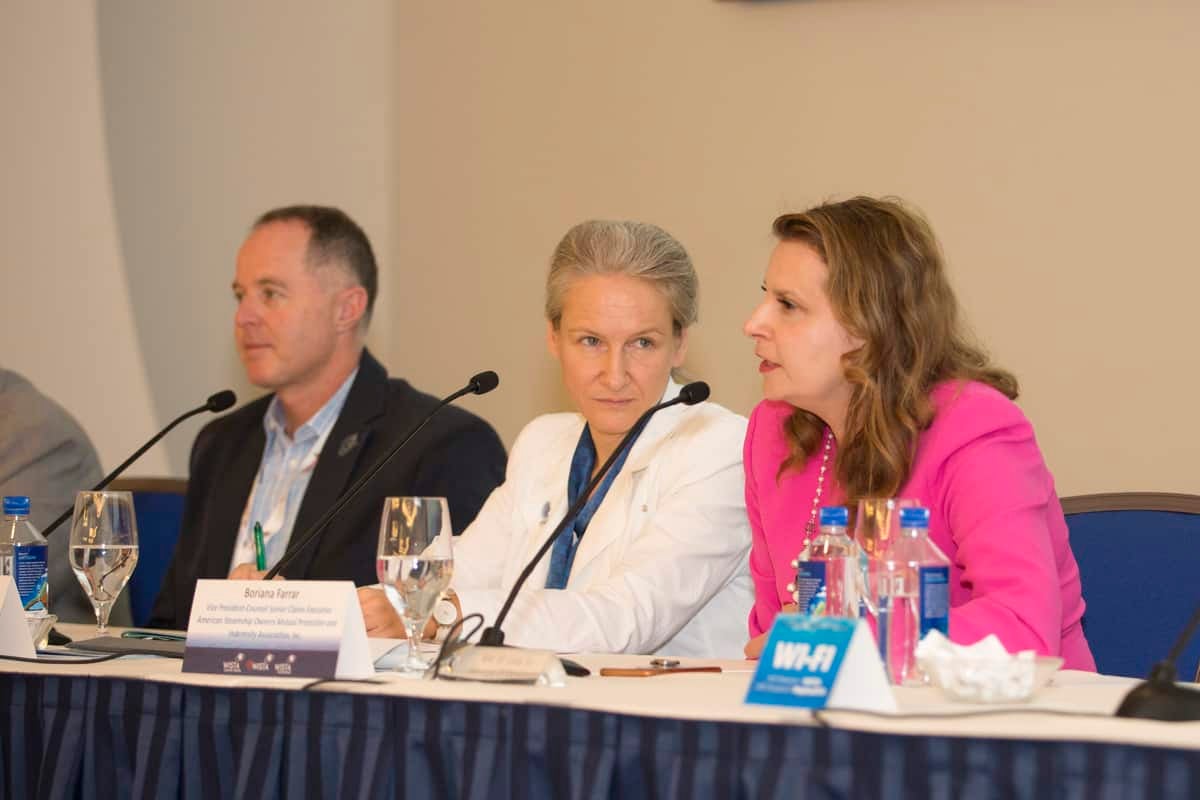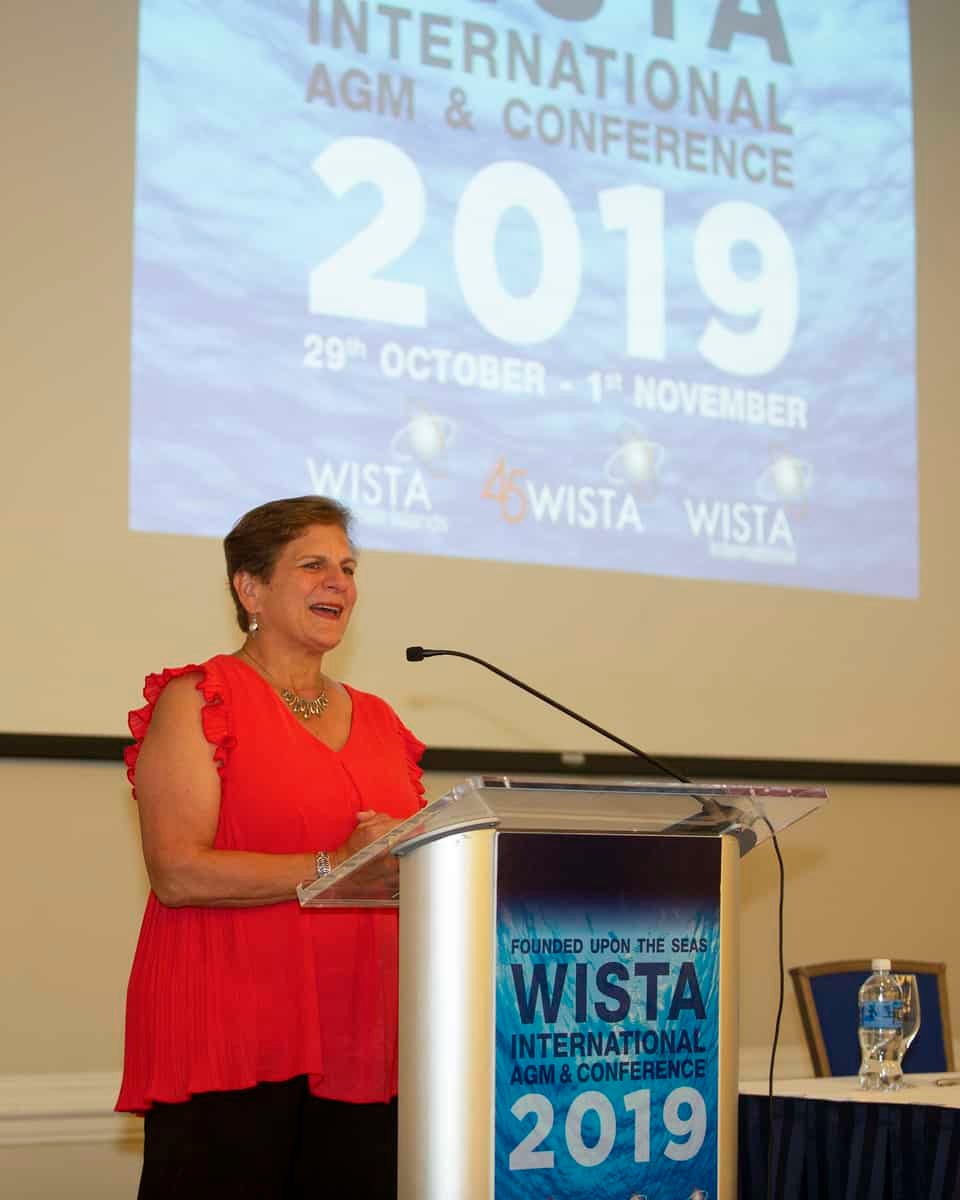Keeping up in a world hurtling toward the dawn of the IMO 2020 mandate is the biggest challenge facing the maritime industry, according to Kathy Metcalf, president and CEO of the Chamber of Shipping of America.
In a discussion at the Women’s International Shipping & Trade Association (WISTA) International Annual General Meeting & Conference, Metcalf and other panelists addressed the many environmental challenges facing women — and men — in the maritime industry.
Front of mind for many attendees at the Nov. 1 event in the Cayman Islands was the International Maritime Organization (IMO) mandate that beginning Jan. 1, all vessels not equipped with exhaust-gas scrubbers must burn more expensive fuel with a sulfur content of 0.5% or less.
Kathi Stanzel, managing director of INTERTANKO, said while hydrogen is a great alternative to high-sulfur fuel, “we currently have no legislation and no regulation that regulates hydrogen as either a fuel or as a cargo.”

‘It’s a mess’
Stanzel, a marine biologist by training, has led INTERTANKO — the International Association of Independent Tanker Owners — since 2012. Focusing on marine pollution from ships, she spent 10 years as the technical adviser to the International Tanker Owners Pollution Federation before joining the IOPC Funds, a United Nations body tasked with administering compensation conventions for oil pollution from tankers.
Stanzel called the fueling of ships with hydrogen “a different ballgame,” particularly because of how much colder it is than liquefied natural gas (LNG), the special handling it requires and the safety risks involved.
“As far as I know, there’s right now only one concept ship that is being developed that is supposed to carry hydrogen from the southern part of Australia to Japan. It’s going to sea trials in December this year. This is the very first one. It’s 100 meters long, it’s a tiny little thing,” Stanzel said.
She commended the maritime industry for being the first “to make a commitment at the IMO last year to actually put some goals in place and really decarbonize this industry,” but she acknowledged it won’t be easy to meet that commitment. “If you look at it overall, it’s a mess.
Unless we have some sort of clear structure for regulation and everyone knows what they’re actually shooting for, as humans we’re just a little bit too stupid to get this solved.”
‘A paradigm shift’
In its sustainable development goals, the IMO said its strategy is to reduce greenhouse gas emissions from ships by 20% by 2023, 40% by 2030 and 50% by 2050.
“The short-term measures are a little bit more concrete, a little bit more reachable, touchable. The 2050 (goal), to reach 50% absolute reduction, is going to require a paradigm shift,” Metcalf said. “It’s going to require new compulsion systems. It’s going to require fuels we probably haven’t even thought of.”
She said LNG and biofuels should be viewed as transitional fuels, not long-term solutions.
“We have to be looking at zero or carbon-neutral fuels.”
Both Metcalf and Stanzel do see fossil fuel-free ships on the horizon.
“I don’t think there will be one solution for all vessels. I think we will have a mix of different propulsion solutions,” Stanzel said. “In terms of long ocean voyages, I think we’re a long way from using batteries. But there will be jumps in technology.”

Metcalf, who served as a deck officer aboard large oceangoing tankers, noted, “In the ’60s and ’70s, we had some pretty big fires and explosions aboard crude carriers. We still carry crude oil, we just learned how to carry it properly. It’s an evolution.”
But Metcalf is “not sure we’re ever going to see electric-powered VLCCs (very large crude carriers) because of the energy requirements. They’re going to have to do a whole lot more than what they’ve done right now, and we’re still seeing them struggling in the automotive industry.”
Ballast water and biofouling
Metcalf, a U.S. Merchant Marine Academy graduate, has spent much of her career keeping up with ballast water treatment practices.
“Twenty-two years ago when I came to work for Joe Cox at the Chamber of Shipping, he said, ‘Your first issue is going to be ballast water, and it’s probably going to be your career.’ I said, ‘Are you kidding me?’” recalled Metcalf, who assumed the role of president and CEO after Cox’s retirement in 2015. “Well, he was right and we’re still not done with it yet.”
The seawater taken into the ballast tanks of a ship to maintain stability isn’t the problem. Ballast water discharge, on the other hand, is believed to be a leading source of invasive species released into the world’s waters.
“The sub-issues associated with ballast water management are obviously the education of the crew on what has to be done, the practicality and the workability of the systems that are being put on, and a disconnect with regulations around the world. It would be great if we had one IMO convention and countries say, ‘We adopt the IMO convention as it is.’ That’s not the case, particularly in the United States, which is one of the biggest offenders,” Metcalf said.
Metcalf called biofouling both a ship-efficiency and environmental issue.
“My opinion [is] biofouling will be the next IMO convention. I really, really believe that because right now we’ve got a mishmash of a lot of different requirements around the world,” including in California, which Metcalf said has “got a pretty extensive biofouling program.”
As with ballast water, the accumulation of microorganisms and algae on a ship’s hull is not the issue. How it is removed from the hull is.
“If you look around the world, some places say, ‘Oh, clean your hulls? Whatever.’ … And then other places are identifying appropriate hull cleaning, which, in many cases, is an underwater cleaner that actually collects all the stuff that’s been taken off the hull” and prevents what Metcalf called “a mass drop of potential invasives.”
Stanzel said commercial ships are not the biggest source of biofouling.

“We know from experience and data that actually commercial shipping isn’t the worst problem,” she said. “It’s recreational vessels that are much more likely vectors of biofouling being carried from one area to another.”
Stranzel said reducing marine pollution from multiple sources requires global regulation and for “people to think longer term and bigger picture.”
Global infrastructure also requires attention, Metcalf said. “We critically need funding for research and development, and we need global funding. Everybody is not a Maersk. Everybody doesn’t have that kind of money. So we need a global research program that’s looking across the sector on what is possible and what can be done.”
She said global matters require global commitment. “A number of us feel, both in the industry and in the flag states, we need to show our commitment to do something,” Metcalf said. “Then comes the question, ‘Will that be enough?’ The science answer at this point is not the same answer, in my opinion, as the political answer.”
‘Walk the talk’
Enforcement of pollution-reduction mandates is a major challenge, according to Jeanne Grasso, a partner in the law firm of Blank Rome LLP.
“From the United States’ perspective, the Coast Guard has stated on numerous occasions that a level playing field is going to be a priority in enforcement actions. So does that mean civil? Administrative? Criminal?” Grasso asked. “It’s going to be whatever it takes to ensure that companies are not able to cheat on these requirements. So I think we’re going to see a lot of enforcement.”
A second challenge for Grasso is what she called the never-ending criminal cases in the United States related to the International Convention for the Prevention of Pollution from Ships (MARPOL).
“These cases have been going on for 25 years, and the irony is they’re not about pollution. They’re about the cover-up of pollution,” Grasso said. “My prediction is this is going to continue to happen the more regulation comes into place. Again, these relate to intentional misconduct, not mistakes. We’re not going to see criminal actions for mistakes but misconduct and cover-ups.”
Grasso said avoiding prosecution can be achieved through compliance and transparency.
“There’s a burden on shoreside management to verify that what is happening on their ship is compliant. There’s nothing worse than being a lawyer defending these cases and having these companies say, ‘We’ve got the greatest compliance programs in place. Let us show you them.’ And then when you ask the questions, ‘How can you demonstrate to me what your programs say?’ And they can’t. Or you’re interviewing the crewmembers asking about these compliance programs and the crewmember will say, ‘I’ve never been trained.’
“There are big disconnects that we see all the time in the context of these enforcement actions, so shoreside really needs to take responsibility, verify compliance. Walk the talk. I’m asked all the time, ‘Why are these cases still happening?’ And I don’t know there’s a good answer. One answer I will say is culture. And if there is a company culture of compliance and the crew knows that shoreside means it, you see a lot fewer problems than you would otherwise. So shoreside walking the talk and verifying compliance is absolutely critical,” Grasso continued.
“Oftentimes compliance is looked as a cost center to companies. That thought process has to change. … It is an insurance policy, really, that’s going to save you a lot of costs down the road because compliance is a way better business decision than defending an enforcement action.”







